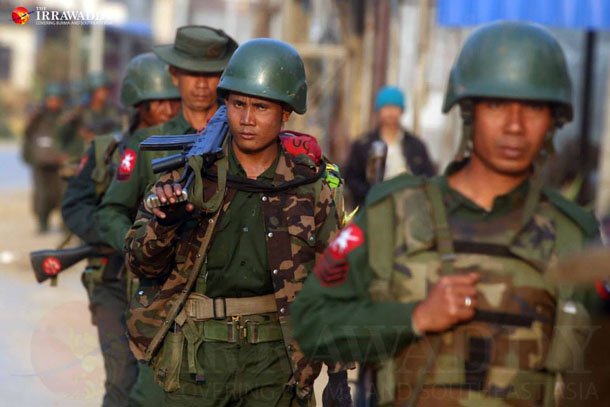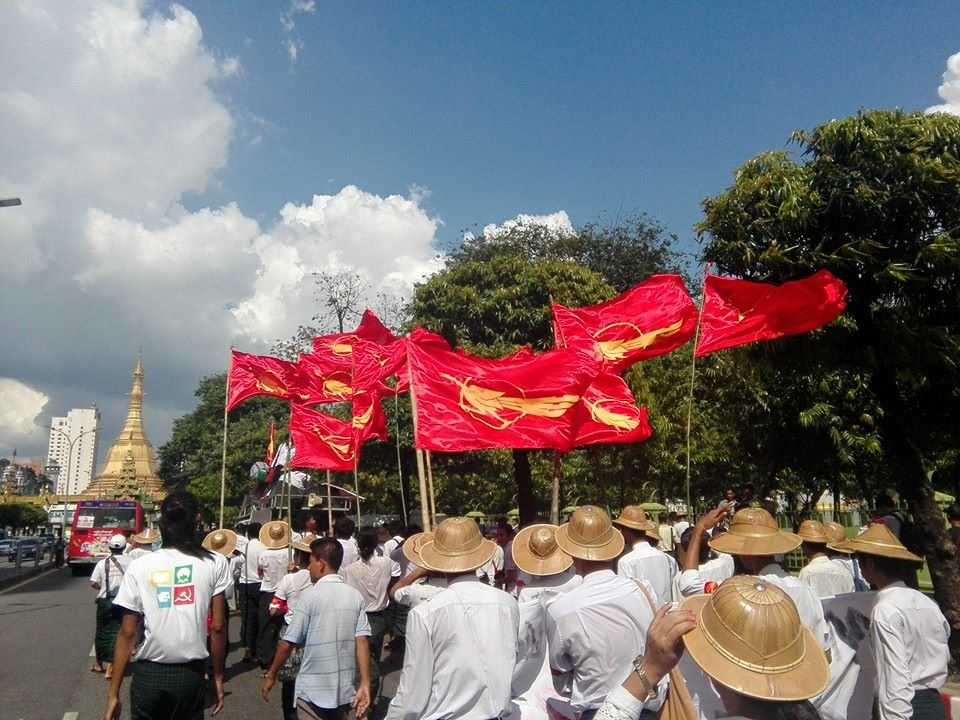Posts Tagged ‘President Thein Sein’ (163 found)
Protection of People Must be Priority in Burma’s Protracted Peace Process
In a new briefing paper titled, “Protection of People Must be Priority in Burma’s Protracted Peace Process” released to mark Union Day, Burma Partnership highlights how the peace process of the Thein Sein Government has been unsuccessful, ultimately leading to many powerful ethnic armed organizations (EAOs) refusing to sign the nationwide ceasefire agreement (NCA). It also resulted in a call by civil society organizations to postpone the Union Peace Conference […]
• • •Caught Between State Censorship and Self-Censorship: Prosecution and Intimidation of Media Workers in Myanmar
 Myanmar’s media landscape has seen a radical change since the country embarked on a series of important political, economic and social reforms, announced by President Thein Sein in March 2011. The lifting of pre-publication censorship, the release of imprisoned journalists and greater space for freedom of expression have seen the development of an increasingly vibrant and diverse media. These media reforms have been lauded by many in the international community, who are keen to point to increased media freedoms as one of the hallmarks – and successes – of Myanmar’s reform process […]
Myanmar’s media landscape has seen a radical change since the country embarked on a series of important political, economic and social reforms, announced by President Thein Sein in March 2011. The lifting of pre-publication censorship, the release of imprisoned journalists and greater space for freedom of expression have seen the development of an increasingly vibrant and diverse media. These media reforms have been lauded by many in the international community, who are keen to point to increased media freedoms as one of the hallmarks – and successes – of Myanmar’s reform process […]
The Burma Government Must Stop Condoning Sexual Violence in Conflict Areas
 On 5 June 2015, Burma Campaign UK released a briefing paper that illustrated the Burma Government’s lack of action towards eliminating sexual violence since it signed the Declaration of Commitment to End Sexual Violence in Conflict (the Declaration) last year. As a signatory to the declaration, Burma agreed to prioritize prevention of sexual violence and to hold all perpetrators accountable to the full extent of the international law, amongst other related commitments.
On 5 June 2015, Burma Campaign UK released a briefing paper that illustrated the Burma Government’s lack of action towards eliminating sexual violence since it signed the Declaration of Commitment to End Sexual Violence in Conflict (the Declaration) last year. As a signatory to the declaration, Burma agreed to prioritize prevention of sexual violence and to hold all perpetrators accountable to the full extent of the international law, amongst other related commitments.
Unfortunately, not only has Burma ignored its commitments to the Declaration, it is also actively violating it, as cases of rape and sexual assault continue to emerge from conflict areas. According to Burma Campaign UK, “Given the widespread nature of sexual violence by the Burmese Army, the refusal to act, and now the violation of commitments made in the Declaration, it can only be concluded that the use of rape and sexual violence by the Burmese Army is condoned at the highest level of the government and the military.” […]
• • •Political Reform and Ethnic Peace in Burma/Myanmar: The Need for Clarity and Achievement
For many citizens a countdown begins to a crucial general election later this year, with warnings of a halt in reform momentum and a more troubling reality behind many of the socio-political changes in the country […]
• • •Yet another Derailment of the Burma Peace Train
 For anyone who believes that the peace process in Burma is making progress, the recent escalation and heavy fighting in northern Shan State and Kachin State, as well as the Union Day deed of commitment signing farce, only goes to show that faith in the ability and commitment of the Burma Government to secure a sustainable peace deal is misguided.
For anyone who believes that the peace process in Burma is making progress, the recent escalation and heavy fighting in northern Shan State and Kachin State, as well as the Union Day deed of commitment signing farce, only goes to show that faith in the ability and commitment of the Burma Government to secure a sustainable peace deal is misguided.
Union Day falls on 12 February, and is the anniversary of the Panglong Agreement signed between General Aung San, and Chin, Kachin and Shan ethnic leaders, an agreement that promised autonomy to the ethnic regions. It has been a reference point for ethnic nationalities ever since, and is symbolic of the possibility of a federal union within Burma whereby the rights of ethnic people are protected […]
• • •Kachin National Organization (KNO) Condemns Rape and Murder of Two Kachin Teachers and Calls for Inqury on Crime against Humanity
KNO strongly condemned the rape and brutal murder of Maran Lu Ra (20 years old) and Tangbau Hkawn Nan Tsin (21 years old), who were volunteer teachers of the Kachin Baptist Convention’s Education Ministry Program. They were gang-raped, severely tortured and murdered in Kawng-Hka village, Nam Tau, Mung Mau district in Northern Shan State by Burma Army soldiers from 503 Light Infantry Regiment, commanded by Major Aung Soe Myin, stationed at the village since 17th January 2015. […]
• • •Burma: Amend Biased Citizenship Law
(New York) – The Burmese government should accept the United Nations call to amend the discriminatory law that deprives Rohingya Muslims of Burmese citizenship, Human Rights Watch said today in a letterto President Thein Sein.
On December 29, 2014, the UN General Assembly adopted a resolution calling on the Burmese government to amend the 1982 Citizenship Law so that it no longer discriminates against the Rohingya. Successive Burmese governments, including the current administration of Thein Sein, have used the law to deny citizenship to an estimated 800,000 to 1.3 million Rohingya by excluding them from the official list of 135 national races eligible for full citizenship […]
• • •Statement on Government Policy on Return and Resettlement of Exiled Activists and Political Forces
After the 2010 elections and during the early days of the reform process, President U Thein Sein’s Government invited Burma/Myanmar diaspora communities, including exiled activists and political forces from different parts of the world who left the country for various reasons, to return to their motherland […]
• • •As 2014 Comes to an End, Students Hold Key to New Chapter in Burma Politics
 As we count down the remaining days of 2014, Burma Partnership takes a look back at what 2014 has offered. It has been nearly four years since President Thein Sein’s administration took office, and now is the time to digest all the developments during his presidency, to assess what the so-called reform process has really meant for the people of Burma thus far. And now is the time to properly examine this new political landscape and to determine who is who.
As we count down the remaining days of 2014, Burma Partnership takes a look back at what 2014 has offered. It has been nearly four years since President Thein Sein’s administration took office, and now is the time to digest all the developments during his presidency, to assess what the so-called reform process has really meant for the people of Burma thus far. And now is the time to properly examine this new political landscape and to determine who is who.
By the time the reforms were announced, everything was already set in motion to ensure that the reform process was controlled and manipulated by members of the old military regime. Looking at the notorious 2008 Constitution, the institutionalized prescription of 25 per cent of the seats in Parliament for military representatives, the dominance of the Union Solidarity and Development Party, the excessive power of the Burma Army and the National Defense and Security Council, and the growing investment of the State and affiliated business cronies in the media sector, it is not hard to conclude that a new system of repressive governance has been installed – by the same people who were once considered one of the most brutal and authoritarian regimes in the world.
However, it is important to remain hopeful. Although the new political landscape has contributed to the sophistication of old problems and the development of new problems, it has also offered Burma people new opportunities. One of the most inspiring aspects of the political developments in 2014 has been the reinstatement of the role of student unions in the country’s political affairs. Burma’s students were always at the center of major democracy movements throughout history – most notably in 1988 – and have now made a comeback. […]
• • •“အစိုးရသစ္ႏွင့္ ျမန္မာႏိုင္ငံ လူ႔အခြင့္အေရး အေျခအေန” အစီရင္ခံစာ
 ၂၀၁၀ ႏို၀င္ဘာလ (၇) ရက္ေန႔ အျငင္းပြားဖြယ္ ေရြးေကာက္ပြဲၾကီး အၿပီး ေပၚထြက္ လာသည့္ ေရြးခ်ယ္ခံ အစိုးရသစ္ လက္ထက္ တြင္ ႏိုင္ငံေရး၊ စီးပြားေရးဆိုင္ရာ အေျပာင္းအလဲ အခ်ိဳ႕ရွိခဲ့ေသာ္လည္း ယခင္ လူ႔အခြင့္ အေရး ခ်ိဳးေဖာက္သူမ်ားအား လံုး၀ကင္းလြတ္ ခြင့္ျပဳထားပါသည္။ ထို႔ျပင္ ယခင္လူ႔အခြင့္အေရး ခ်ိဳးေဖာက္ ခံရသူမ်ားအား ျပန္လည္ ကုစားေပးမႈ လံုး၀မရွိေပ။
၂၀၁၀ ႏို၀င္ဘာလ (၇) ရက္ေန႔ အျငင္းပြားဖြယ္ ေရြးေကာက္ပြဲၾကီး အၿပီး ေပၚထြက္ လာသည့္ ေရြးခ်ယ္ခံ အစိုးရသစ္ လက္ထက္ တြင္ ႏိုင္ငံေရး၊ စီးပြားေရးဆိုင္ရာ အေျပာင္းအလဲ အခ်ိဳ႕ရွိခဲ့ေသာ္လည္း ယခင္ လူ႔အခြင့္ အေရး ခ်ိဳးေဖာက္သူမ်ားအား လံုး၀ကင္းလြတ္ ခြင့္ျပဳထားပါသည္။ ထို႔ျပင္ ယခင္လူ႔အခြင့္အေရး ခ်ိဳးေဖာက္ ခံရသူမ်ားအား ျပန္လည္ ကုစားေပးမႈ လံုး၀မရွိေပ။
အစ္ိုးရသစ္ လက္ထက္တြင္ ႏိုင္ငံအတြင္း လႊတ္ေတာ္မ်ား၊ အုပ္ခ်ဳပ္မႈ ပံုစံမ်ား အသစ္မ်ားႏွင့္ ျမန္မာႏိုင္ငံအမ်ိဳးသား လူ႔အခြင့္ အေရးေကာ္ မရွင္တို႔ ေပၚေပါက္ လာခဲ့ေသာ္လည္း လူထု၏ အေျခခံ အခြင့္အေရးမ်ားကို ထိေရာက္သည့္ ကာကြယ္မႈေပးရန္ ပ်က္ကြက္ဆဲျဖစ္သည္။ လႊတ္ေတာ္ မ်ားမွ ဥပေဒမ်ားေရးဆြဲျပဌာန္း မႈတြင္လည္း လူထု၏ အခြင့္အေရးမ်ားကို အေလးထား ထည့္သြင္းေရးဆြဲျခင္း မျပဳေပ။ ယခင္အစိုးရ အဆက္ဆက္ လူထုအားခ်ဳပ္ကိုင္သည့္ ဥပေဒမ်ားအား ဖ်က္သိမ္းျခင္း၊ ျပင္ဆင္ျခင္း၊ အသစ္ေရးဆြဲျခင္းမ်ား မရွိသေလာက္ နည္းပါးလွ်က္ ရွိပါသည္။ ျမန္မာႏိုင္ငံ အမ်ိဳးသား လူ႔အခြင့္အေရးေကာ္မရွင္ တစ္ရပ္ေပၚေပါက္ လာ ေသာ္လည္း လူ႔အခြင့္အေရး ခ်ိဳးေဖာက္မႈမ်ားအေပၚ ထိေရာက္သည့္ ကာကြယ္မႈမ်ား မေပးႏိုင္ျခင္း၊ ၄င္းေကာ္မရွင္၏ လုပ္ပိုင္ ခြင့္မ်ားအား ထိန္းခ်ဳပ္ ကန္႔သတ္္မႈ မ်ား ခံေနရၿပီး လူ႔အခြင့္ အေရးျမွင့္တင္ရန္ ကိစၥရပ္မ်ားကိုလည္း ေဆာင္ ရြက္ႏိုင္ျခင္း မရွိေပ။ […]
• • •








 All posts
All posts